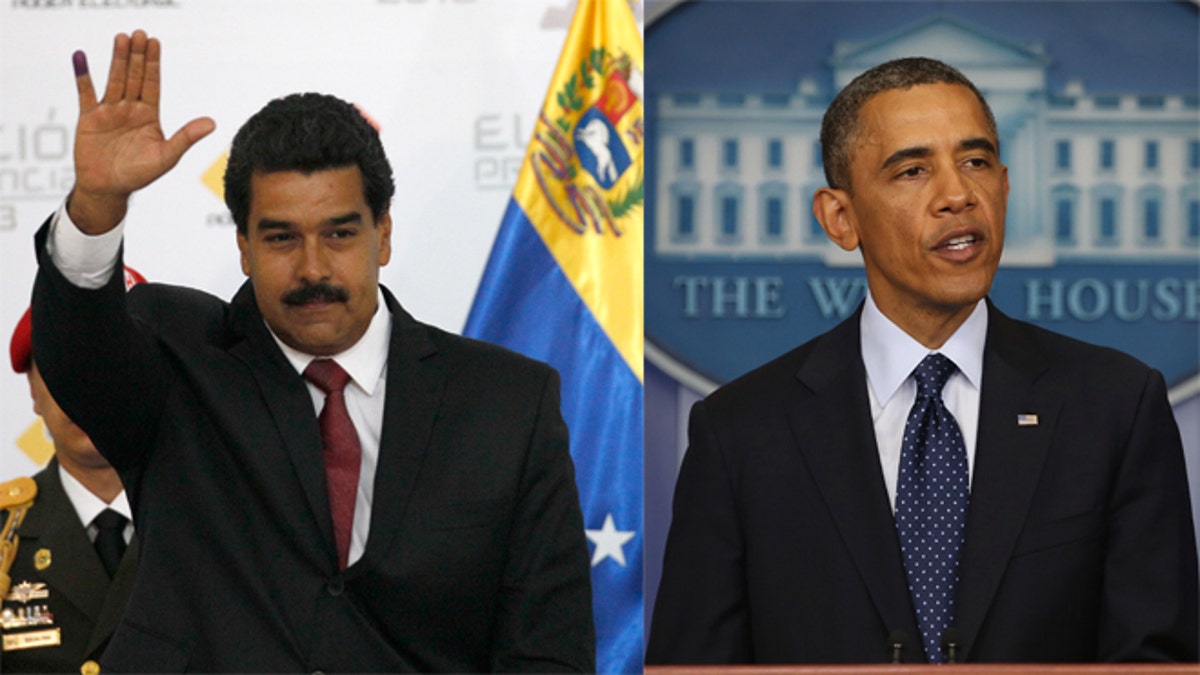
While the ultimate impact of the Venezuelan presidential election remains to be seen, what's for sure is that relations between the United States and the administration of President-elect Nicolás Maduro will continue to be as tense as under the late Hugo Chávez, experts said.
After voting on Sunday in a Caracas slum, Maduro said that while he would like to reestablish relations with the U.S. “in terms of equality and respect,” Washington will always try to undermine his rule.
These words followed a steady rhetoric on the campaign trail of Maduro accusing the U.S. of conspiring against him and causing disruptions in Venezuela to unseat his rule, including working with opposition labor unions and causing electric power blackouts.
Experts argue that given Maduro’s anti-American sentiments leading up to the election, as well as the controversy surrounding his victory and the polarization in Venezuela, there is little hope for a change in relations between the countries.
It’s hard to see [Maduro] backing off his rhetoric in the aftermath of the election...Americans will insist on a level of respect that he is not going to give them.
“It’s hard to see [Maduro] backing off his rhetoric in the aftermath of the election,” Eric Hershberg, the director of American University’s Center for Latin American and Latino Studies, told Fox News Latino. “Americans will insist on a level of respect that he is not going to give them.”
The death of Hugo Chávez put Maduro and the rest of the Venezuelan left in a difficult position. Chávez’s charisma held the movement together and his social spending allowed him to skirt the dicey issues of rising inflation, high crime and a fledgling economy.
While the current election results are still being debated, how Maduro faces the country’s mounting problems – both politically and socially – are what will decide is he and Chavismo survive his six-year term.
In 2009, Chávez led a successful push for a constitutional referendum that abolished term limits for the offices of President, state governors, mayors and congress members. The previous provision established a three-term limit for deputies and a two-term limit for the other offices, but with the 2009 referendum, Chávez – or any other leader – could ostensibly stay in power indefinitely.
Maduro does not have the charm or power to hold the Chavista movement together nor make Venezuelans forget about the problems plaguing their nation. If Sunday’s vote is any indication, Venezuela is torn between Chávez’s legacy and a dismal future, with the official results giving Maduro 51 percent of the vote to challenger Henrique Capriles’ 49 percent – although opposition sources showed Capriles winning by more than 300,000 votes.
“Chávez could overcome the detractors because he was viewed as a national hero, Maduro doesn’t have that,” said Larry Birns with the Council for Hemispheric Affairs.
To maintain his credibility within the Chavista movement and fend off opponents from within his own party, Maduro needs to maintain his opposition to the U.S. and continue to paint Americans as imperialist intruders, experts said.
“He’s got to worry about the opponents that will pose a threat to his rule,” Birns said. “These are difficult times for Maduro and no one knows how the scenario will play out.”
For its part, the United States is not in better shape when it comes to its relations with Venezuela – or other Latin American nations. Diplomatic disputes with Venezuela and touchy relations with neighboring Bolivia and Ecuador have led to a schism between the United States and the countries in the Bolivarian Alliance for the Americas.
Hershberg said that the Obama administration's refusal to accept the official results of Venezuela's election will not only anger Maduro, but could be viewed as hypocritical in the light of the scandal surrounding the uncounted votes during the 2000 U.S. presidential election that saw George W. Bush defeat Al Gore.
The U.S. has a long history of political involvement – both overtly and covertly – in elections throughout Latin America.
“For the Americans to say this only 12 years after Bush. V. Gore is remarkable,” he said. "Latin America looked at the U.S. and said that the U.S. will never again be able to tell us how to conduct our elections.”
“This makes them look absurd,” he added, about the State Department’s refusal to recognize the election of Maduro.
The State Department said it was "difficult to understand" why the commission certified ruling party candidate Nicolás Maduro as the winner in the absence of a recount, which challenger Henrique Capriles is demanding.
It also condemned the post-election violence that has killed at least seven people and injured 61.
In a televised broadcast Tuesday, Justice Minister Nestor Reverol accused Capriles of numerous crimes, including insurrection and civil disobedience.
Maduro blamed Capriles personally.
"You are responsible for the dead we are mourning," he said, calling Capriles "the defeated candidate."
Government officials have been alleging since Monday that Capriles is plotting a coup, and President-elect Maduro announced that he was prohibiting an opposition march scheduled for Wednesday in the capital.
On Tuesday Capriles' supporters protested in cities including Merida and Maracay.
The Associated Press contributed to this report.











































